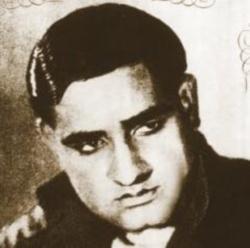
Kundan Lal (K.L.) Saigal (11 April 1904 – 18 January 1947) was an Indian singer and actor who is considered
the first superstar of the Hindi film industry, which was centered in Calcutta during Saigal's time, but is
currently centered in Mumbai.
Early life
Saigal was born at Jammu where his father Amar Chand was a tehsildar at the court of the Raja
of Jammu & Kashmir. His mother Kesar Bai was a deeply religious lady who was very fond of music. She used to take
her young son to religious functions where bhajan, kirtan and shabad were sung in traditional styles based on
classical Indian music. Saigal was the fourth-born child of five and his formal schooling was brief and
uneventful. As a child he occasionally played Sita in the Ramlila of Jammu. Saigal dropped out of school and
started earning money by working as a railway timekeeper. Later, he worked as a typewriter salesman for the
Remington Typewriter Company, which allowed him to tour several parts of India. His travels brought him to
Lahore where he befriended Meharchand Jain (who later went on to start the Assam Soap Factory in Shillong)
at the Anarkali Bazaar. Meharchand and Kundan remained friends when they both moved to Calcutta and had many
a mehfil-e-mushaira. In those days Saigal was a budding singer and Meharchand encouraged him to pursue his
talent. Saigal often remarked that he was what he was because of Meharchand's encouragement and early support.
He also briefly worked as a hotel manager. Meanwhile, his passion for singing continued and became more
intense with the passage of time.
Move to Bombay and death
In December 1941, Saigal moved to Bombay to work with Ranjit Movietone. Here he acted and sang in a number of
successful films. Bhakt Surdas (1942) and Tansen (1943) were hits during this period. The latter film is still
remembered for Saigal's performance of the song Diya Jalao in Raga Shuddha Kalyan; in the same movie, he also
sang "Sapta Suran,Tin .. Gaa-o Saba Guni Jan". In 1944, he returned to New Theatres to complete Meri Behen.
This film contained the songs Do Naina Matware and Ae Qatib-e-Taqdeer Mujhe Itna Bata De.
By this time, alcohol had become a predominant factor in Saigal's life. His dependence on alcohol had begun
affecting his work and his health. It was said that he could only record a song after being fortified with liquor.
He survived ten years of drinking; however, his alcoholism was too advanced for even a single attempt at abstinence,
and Saigal died in his ancestral city of Jalandhar on 18 January 1947, at the age of 42. However, before his death,
he was able to churn out three more hits under the baton of Naushad for the film Shahjehan (1946). These are Mere
Sapnon Ki Rani, Ae Dil-e-Beqaraar Jhoom and Jab Dil Hi Toot Gaya. Parwana (1947) was his last film, released after
his death, in which he sang under the baton of Khawaja Khurshid Anwar. The four songs which Saigal sang in Parwana
are: Toot gaye sab sapne mere, Mohabbat mein kabhi aisi bhi haalat, Jeene ka dhang sikhaae ja, and Kahin ulajh na
jaana. Saigal was survived by his wife Asha Rani (whom he married in 1935); three children, a son and
two daughters: Madan Mohan, Nina (born 1937) and Bina (born 1941); and an adopted child, his elder brother's
daughter, Durgesh Nandani, whom he adopted when he was still single.
In a career of fifteen years, Saigal acted in 36 feature films - 28 in Hindi, 7 in Bengali, and 1 in Tamil.
In addition, he acted in a short comedy Hindi film, Dulari Bibi (3 reels), released in 1933. In 1955 B.N. Sircar
released a documentary film based on the life of K.L. Saigal, Amar Saigal. In the film, G. Mungheri performed the
title role of Saigal. The film contained 19 songs lifted from Saigal's films. In all, Saigal rendered 185 songs
which includes 142 film songs and 43 non-film songs. Of the film songs, there are 110 in Hindi, 30 in Bengali
and 2 in Tamil. There are 37 non-film songs in Hindi, and 2 each in Bengali, Pashto, Punjabi and Persian.
His non-film songs comprise bhajans, ghazals and hori. He has rendered the creations of poets such as Ghalib,
Zauq, and Seemab.
Saigal's distinctive singing voice was idolized by the first generation of post-independence Hindi Film playback
singers, including Lata Mangeshkar, Mohammad Rafi, Mukesh, and Kishore Kumar.)